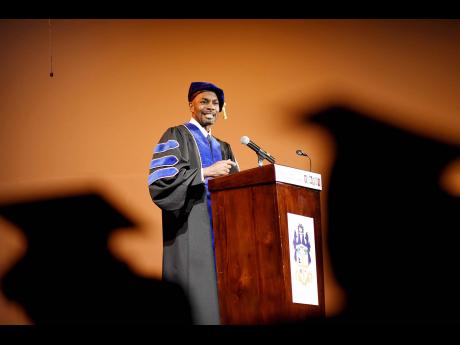Paul Wright | The ability to think
The only Olympian with a well-documented 'puppalick' is Dr Gregory Haughton, an athlete who combined academic excellence with athletic prowess and ability, gave a thoughtful speech at the 2018 graduation at the Edna Manley College of Visual Arts on Saturday.
One aspect of his wide-ranging address was his observation of the lack of mental training as part of the development of our sport practitioners. Haughton's observation is spot on. He has voiced a regular and perennial complaint of lesser lights (Gleaner columnists), whose observations and comments in this regard have been ignored, for the most part by those whose responsibilities include the development of sports in Jamaica.
Our Island, richly blessed with children and adults of extraordinary athletic ability, has consistently failed to be the best in the world in team sports, while conquering all in individual events. This lack of mental ability and fortitude is painfully on show in the game of cricket. In the men's game, we have undoubted world-rated stars, but when it comes on to games where ability, form, and the ability to THINK at crucial stages of the game, when things are not going well, the ranking of the Windies among Test nations tell the sorry tale.
In the present ICC Women's T20 taking place in the West Indies, our female cricketers are so far unbeaten. Seeing off all their opponents even though at different stages in all but one of their matches, defeat was a clear and present danger. But the ability to THINK by these ladies, including those who by no stretch of the imagination could be termed 'world stars', saw them snatching victory from the jaws of defeat over and over again. The reason: the ability to THINK and adjust their game when the going got tough.
Start with young
That mental fortitude that Haughton identified cannot be coached. It has to be taught and developed at the early stages of an athlete's life. It must start with the young. The best coaches do this: look at the results of our junior teams at the world level. So, what happens to our adult athletes at the world level? What has happened to their ability to THINK when the going gets tough? Money and arrogance. "You know me" seems to be the thinking behind inexplicable mental lapses in tight team games when the going gets tough. These same men, who as juniors seem to know what to do in adjusting their game, fail miserably when competing against other teams at the world level.
The bald fact is that we don't know you. The same junior who thought his/her way out of difficult situations suddenly acts in a way that defies description. Shot selection by the batters is so poor that it looks criminal. The ability to bowl a ball in the areas of the pitch that minimise big scores, suddenly leaves the mind of our adult bowlers. With fielders who as juniors caught most of the catches that come their way, balls on the ground that pass within a dive of an outstretched hand, inexplicably, are either dropped or somehow pass harmlessly under their bodies.
The answer: A sports psychologist. A trained scientist who is able to assist the athlete in making the right decision when the going gets tough. We have trained sport psychologists in Jamaica. Those that have been hired to assist teams have done well, and then after success and victory, they are discarded and the sums set aside for their remuneration is channelled to something else, with the usual result: defeat. When will we learn? When will medicine and science be an integral component of Jamaican sports? The answer? When the present cadre of sport administrators eventually realise that the modern game has passed them by, and that new (young) ideas and leaders are needed. But in my beloved country, no leader voluntarily leaves, even when the sport that they are administering falls precipitously in world ranking. In a Trump-like manner, they rush to the airwaves and praise themselves while the sport and the fans suffer. Sigh.


